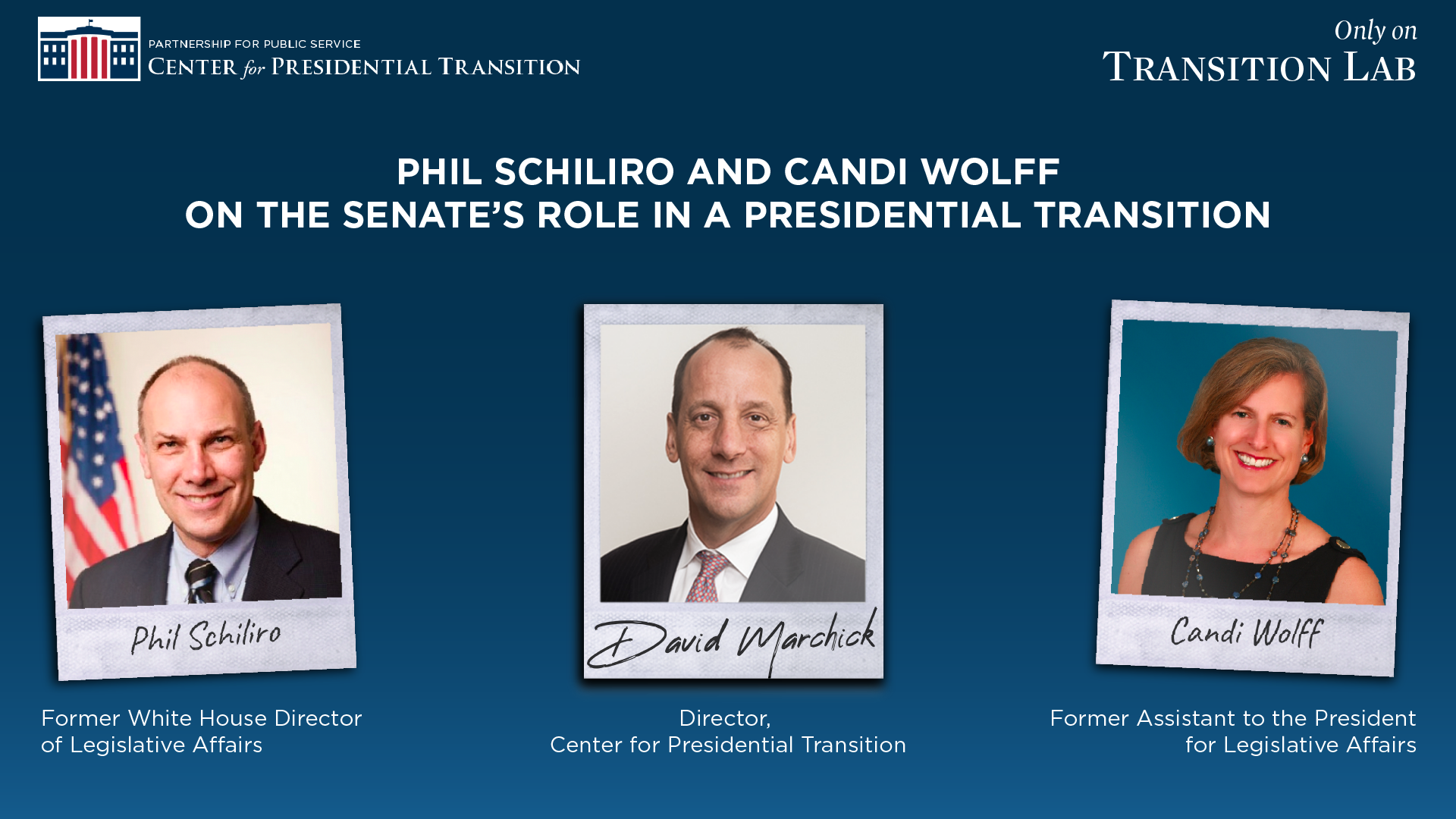Blog
January 04, 2021
Phil Schiliro and Candi Wolff on the Senate’s Role in a Presidential Transition
This week’s episode of Transition Lab focuses on the Senate confirmation process with Phil Schiliro and Candi Wolff.
Wolff, the head of global government affairs at Citi, served as the Assistant to the President for Legislative Affairs under President George W. Bush. She was the first woman to hold that position. Schiliro worked on Capitol Hill for nearly three decades before serving as congressional liaison for the 2008 Obama transition and director of legislative affairs for the Obama White House. He helped pass numerous laws during his long career, including the 1990 Clean Air Act and the Affordable Care Act.
In this episode, host David Marchick speaks with Schiliro and Wolff about how legislative affairs teams help move presidential nominees through the Senate, the slow Senate confirmation process and how President-elect Biden might manage his relationship with the Senate in 2021.
[tunein id=”t159829396″]Read the highlights:
Schiliro described working in the White House Office of Legislative Affairs.
Schiliro: “To do the job right, you have to be saying ‘no’ to Congress a lot during the day and then, in the late afternoon, come back to the White House and tell White House staff ‘no’ on what they want Congress to do. …People on both sides are tired of you saying ‘no.’ …I don’t think there’s another office in the White House that is as involved [in Congress] as the Office of Legislative Affairs because virtually everything the president does touches on Congress.”
Schiliro explained why the Senate confirmation process takes so long.
Schiliro: “Each nominee goes through a vetting process ahead of time, but there’s a second vetting process after the person’s nominated. …One of the big issues becomes prioritizing the nominees after the Cabinet. People on Capitol Hill may have different views than people in the White House on what that sequence is going to be. …There’ll be committees that have to do hearings for multiple nominees, so you’re stretching the committees to capacity. Then there’s the problem of floor time. …The White house will have priorities [and] the Senate leadership will have different priorities. …And [sometimes] nominees become pawns for a policy dispute, [leading] senators to put holds on nominees. …When you add all that together, it ends up being a very complicated, lengthy process.”
Schiliro and Wolff described how increased partisanship has affected the Senate confirmation process.
Schiliro: “There’s always been partisanship, but some of the norms that used to be in place have slowly eroded over time. …We had a situation that bothers me because she was a friend of mine. Cassandra Butts, who was President Obama’s nominee to be ambassador to the Bahamas, had a hearing in May 2014. But then holds were put on her by two senators. She waited over 800 days for a vote and she died during that process. …One senator put a hold on her because he objected to the Iran nuclear deal. Another senator was upset about something that he thought President Obama did, knew he was friends with Cassandra and put a hold on her to inflict pain on the president.”
Wolff: “Members on both sides of the aisle feel like they can just hold up the nominees for unrelated reasons, not because of the qualification or their ability to do the job. …You have to have the team and the people who can work off the holds and figure out if you can come up with a solution. It’s incredibly frustrating.”
Schiliro and Wolff discussed how the Georgia runoffs might affect the Biden administration’s pre-inaugural political appointment work.
Wolff: “The process is going to be slow because we have to wait for the results in Georgia. And then after that, you have to have the two leaders meet to determine who’s on the committees. All of those processes have been put on hold. Normally they would be completed in December. …Right now, the Biden team can’t begin those discussions. And is the ratio [of Republicans to Democrats in the Senate] 50-50? Unfortunately, [these factors] will initially slow the process.”
Schiliro: “Layered on top of that is the coronavirus pandemic, which is impacting the ability of senators to actually be in Washington. Ideally, we’ll know the results in Georgia quickly, but if they’re close races, that could take four, five or six days, and the Senate will be in limbo during that period. …I would expect a slower process for any nominee that’s not a consensus nominee.”
Wolff explained why the COVID-19 pandemic might lead to faster Senate confirmations.
Wolff: “Crises tend to drive action. I see the pandemic as a driver that will focus attention on the Department of Health and Human Services. The Biden team can make the point that to get the vaccines approved, to get the distribution done, to deal with the health crisis, you have to have someone at HHS. [This] should result in a faster confirmation process.”
Wolff and Schiliro described their proudest moments in the White House and biggest legislative accomplishments.
Wolff: “It was a privilege to work [in the White House], provide public service and support the American people. …The legislation that I’m most pleased with is when one of the last trade agreements that got through. I remember that passing with one vote in the House and feeling really good about knowing where the vote count was going to be.”
Schiliro: “It was a combination of things—trying to give the president a realistic, accurate assessment as we were developing strategies of what would work and what wouldn’t work, and having a team at the White House Office of Legislative Affairs that was just terrific. …If I had to pick a piece of legislation, it was the Affordable Care Act because it meant so much to the president, it was difficult to do and we had to navigate so many problems.”



